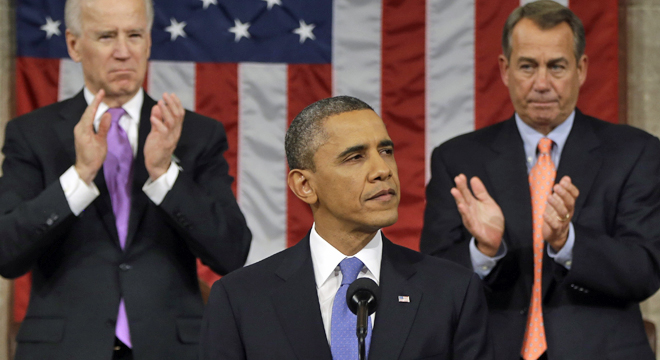I had a hard time getting a clear read on this State of the Union address. But here are a few thoughts.
We were prepped to think this speech would be aggressive, confrontational, sharp, a shower of adjectives. My sense was a bit different. I found the tone aggressive, more declarative, less exploratory. The subtext was: I’ve made up my mind. And yet it was actually replete with references to potential points of bipartisan compromise — virtually every one he tried to strike over his first four years in office. The tone was simply different. I’d describe it like this: We can do this together. But if you won’t, whatever guys, I’m done with that.
I didn’t hear quite as clearly as I expected the central argument that deficit cutting is an important longterm goal but it’s not a policy for creating jobs. In fact, done too aggressively it’s the best way to kill jobs. He said it. But not as clearly, not as sharply, as I might have expected or liked. Perhaps the appeal of government belt-cutting in hard times (which is very real) is simply too great to hit head on. I’ll leave that to others to decide.
What stayed with me after the speech was this email from TPM Reader LF: “‘They deserve a vote’: That was the first time I have ever seen a State of the Union Address seem like a campaign rally.”
A similar comment in a partisan voice has already become a key post-speech talking point from Republicans. Was he right? On one level he definitely was, though it didn’t really occur to me until LF said it.
But if you look back over history this has always been a theme of State of the Union addresses from President’s with a clear agenda which they mean to push with support from the public at large.
That’s good. Every administration banks numerous faults and shortcomings over four long years. But the central one for Obama — the one at the root of so many others — was isolation, a withdrawal from public politics as soon as he got down to the serious work of crafting policy and pushing change. He had more excuse for this than most presidents since he came into office in the midst of a series of unanticipated and historic crises. But I believe the genesis of it was in the man himself. This isn’t the same as, though it’s related to, saying his messaging was off or he didn’t explain his policies well enough. And that’s the refrain of everyone who gets disappointing political results. It goes beyond that.
The problem was believing that you get elected and then you sit down and negotiate and haggle with the stakeholders in Washington, as the 4 years of a presidency is one long time out. But that’s neither an accurate read of the structure of American politics or a recipe for maintaining support for major policy initiatives.
Washington isn’t an autonomous zone of power in our politics. It’s more like a garden of tendrils, each with roots reaching back into the country. Not to some imagined ‘people’ but to disparate and discrete communities, organized interests, businesses, unions, overlapping ethnic communities, various loud mouths and power brokers. We talk about Washington being out of touch and unresponsive. But really, when the public is engaged, it’s very reactive. In the domestic sphere, the people writ large are always the only real ally the president can have. All his or her power is concentrated in their potential support because the chief executive’s formal powers in this realm are surprising thin. Pushing changes behind closed doors is like playing the game not with one but with both arms behind your back.
More than that, it not only creates suspicion, it encourages a mandarin-like approach to policy-making that produces policies that are hard to explain and quite often, on the substance, over-complicated. In other words, it’s not just optics. The people are the best editor for complex policies — especially for policy wonks with a tendency to fall into over-complexity. Politics isn’t a bad word. It’s a boat we’ve committed ourselves to by living in a democracy. Change, for Republicans or Democrats, conservatives or progressives, is always a political thing. It’s always a campaign. And I get the sense that Obama now undertands that.






